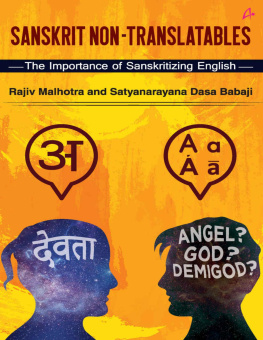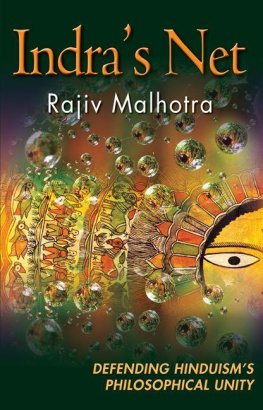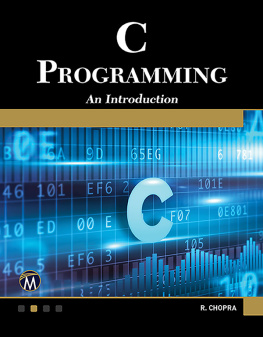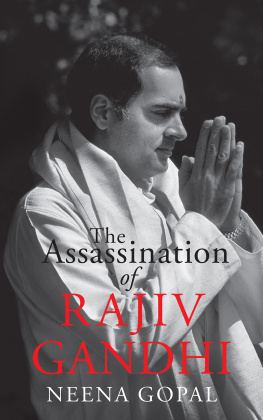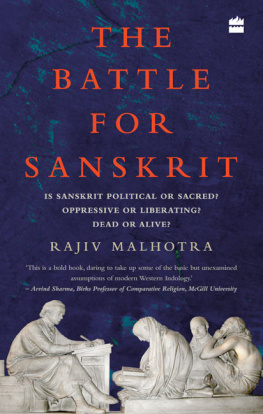Rajiv Malhotra - Sanskrit Non-Translatables: The Importance of Sanskritizing English
Here you can read online Rajiv Malhotra - Sanskrit Non-Translatables: The Importance of Sanskritizing English full text of the book (entire story) in english for free. Download pdf and epub, get meaning, cover and reviews about this ebook. year: 2020, publisher: Amaryllis, genre: Religion. Description of the work, (preface) as well as reviews are available. Best literature library LitArk.com created for fans of good reading and offers a wide selection of genres:
Romance novel
Science fiction
Adventure
Detective
Science
History
Home and family
Prose
Art
Politics
Computer
Non-fiction
Religion
Business
Children
Humor
Choose a favorite category and find really read worthwhile books. Enjoy immersion in the world of imagination, feel the emotions of the characters or learn something new for yourself, make an fascinating discovery.
- Book:Sanskrit Non-Translatables: The Importance of Sanskritizing English
- Author:
- Publisher:Amaryllis
- Genre:
- Year:2020
- Rating:3 / 5
- Favourites:Add to favourites
- Your mark:
- 60
- 1
- 2
- 3
- 4
- 5
Sanskrit Non-Translatables: The Importance of Sanskritizing English: summary, description and annotation
We offer to read an annotation, description, summary or preface (depends on what the author of the book "Sanskrit Non-Translatables: The Importance of Sanskritizing English" wrote himself). If you haven't found the necessary information about the book — write in the comments, we will try to find it.
Sanskrit Non-Translatables: The Importance of Sanskritizing English — read online for free the complete book (whole text) full work
Below is the text of the book, divided by pages. System saving the place of the last page read, allows you to conveniently read the book "Sanskrit Non-Translatables: The Importance of Sanskritizing English" online for free, without having to search again every time where you left off. Put a bookmark, and you can go to the page where you finished reading at any time.
Font size:
Interval:
Bookmark:

Praise for Sanskrit Non-Translatables
This book takes the battle for Sanskrit into the territory of the English-speaking public. It makes a convincing case that English is deficient in its ability to express the profound meanings of the shastras for which Sanskrit words are necessary. By following the authors advice, English will become enriched with key Sanskrit terms that are non-translatable. As English has assimilated non-translatable terms from virtually all major world languages, and takes pride in doing so, there is no reason why it should hesitate to do so for Sanskrit, a Classical language very much alive today. I congratulate the authors for their innovative thinking and bold initiative.
Swami Govindadev Giri,
Trustee and Treasurer, Shri Ram Janmbhoomi Teerth Kshetra
As an avid student of Rajiv Malhotras combative intellectual journey, I was anticipating this book. In the characteristic Indian Dharma Rakshak Parampara defending Indian civilization over millennia by both shastra and shaastra in the lineage of shaastra exegetes such as Yaska, Adi Shankara, Guru Gorakhnath, Ramanujacarya, Hemacandracarya, Gyaneshwar, the Sikh Gurus, Sri Aurobindo and Swami Vivekananda, Rajiv Malhotra is a one-man army to take on Western thought. After the 19th century honeymoon with Sanskrit-Hindu intellectual heritage, Western thought has had the political agenda of subverting Hinduism and Hindu culture by the Macaulayised assault on its texts and thoughts. Like a seasoned strategist, Malhotra began from the outer circle and has moved into the conceptual garbhagrha of the Western methodology with this book, Sanskrit Non-Translatables. This comes after his earlier works articulating the Hindu Civilization as the alternative ( Being Different), exposing the adversarys agenda of fracturing this alternative ( Breaking India), counterpoising it with Hinduisms deep conceptual
integrity ( Indras Net), dispossessing the adversary of the weapon
they had tried to appropriate ( The Battle for Sanskrit) and now the heart of the matter the counterattack on the studied subversion of the conceptual frame of Hindu civilizational thought by
Christianising the core categories through motivated interpretive translations. This book takes fifty-four indisputably foundational concepts, arranges them in a fourfold typology that moves from terrafirma to terra cognita to the cosmos, and contests the irrationality, the untenability and the design of their widely employed English equivalents. The demolition of this conceptual subversion sets free the autonomy of the Indian thought and mind. With its well-thought out prefatory essays, this is a book that every English-educated Indian must read to further decolonise his mind and stand up to the hegemony of Western thought.
Dr. Kapil Kapoor, Chairman,
Indian Institute of Advanced Study, Shimla
Rajiv Malhotra carries his battle for Sanskrit a step further in this book. Short of having Sanskrit itself as the language of pan-Indian intellectual discourse, we must insist that as long as English continues to play this role, Sanskrit words should be used in English on account of their unique semantic valence so that a whole culture and an entire worldview is not lost in translation.
Prof. Arvind Sharma,
McGill University
Sanskrit Non-Translatables by Rajiv Malhotra and Satyanarayana Dasa Babaji is an important book that provides lucid explanations of the central concepts of Sanatana Dharma, and brings attention to the many errors and distortions that have been introduced by the use of English words that do not quite do justice to the Sanskrit originals.
It makes a powerful case for what it calls the Sanskritization of the English language by introducing key Sanskrit loanwords into English vocabulary and keeping them untranslated. This is a bold and innovative approach that deserves to be pursued in parallel with teaching Sanskrit itself. It is nothing short of spreading Vedic
sanskriti into the English-speaking world by penetrating their minds with powerful Sanskrit terms.
Dr. Subhash Kak,
author of Matter and Mind, The Gods Within, and other books
This is an indispensable book addressing the difficult situation today
that Sanskrit terms pregnant with meaning cannot be translated into any foreign language; yet we have to make them understandable to people of other cultures who want to learn Sanskrit from the point of view of jigisha rather than jijnasa. The authors have worked hard to collect relevant material from various sources to prove that the English translations of many Sanskrit terms are false and misleading.
Dr. Korada Subrahmanyam,
author of Theory of Language: Oriental & Occidental, and other books
This book is an eye-opener and argues a highly original and audacious thesis to enrich the English language by adding Sanskrit words that have no English equivalent. These unique words bring profound meanings discovered by the ancient rishi-s. For English language speakers, it will not only enhance their vocabulary but also introduce them to entirely new concepts for understanding of reality.
Dr. Vijay Bhatkar,
Chancellor, Nalanda University
Sanskrit Non-Translatables

Sanskrit Non-Translatables
The Importance of Sanskritizing English
Rajiv Malhotra and Satyanarayana Dasa Babaji
Foreword by
Nityananda Misra

An imprint of Manjul Publishing House Pvt. Ltd.
7/32, Ansari Road, Daryaganj, New Delhi 110 002
Website: www.manjulindia.com
Registered Office:
10, Nishat Colony, Bhopal 462 003 India
Copyright Infinity Foundation, 2020
This edition first published in 2020
ISBN 978-93-90085-48-4
Rajiv Malhotra and Satyanarayana Dasa Babaji asserts the
moral right to be identified as the author of this work.
Cover design: Divya Sharma, Infinity Foundation
The content of the book is the sole expression and opinion of its authors, and not necessarily that of the publisher. No warranties or guarantees are expressed or implied by the publishers choice to include any of the content in this volume. Neither the publisher nor the authors shal be liable for any physical, psychological, emotional, financial, or commercial damages, including but not limited to, special, incidental, consequential or other damages.
Al rights reserved. No part of this book may be used or reproduced, stored in or introduced into a retrieval system, or transmitted, in any form, or by any means (electronic, mechanical, photocopying, recording or otherwise) without the prior written permission of the Publisher. Any person who does any unauthorized act in relation to this publication may be liable to criminal prosecution and civil claims for damages.
Contents
Foreword
Anuvada, which literally means saying again or restating
( anuvadanam anuvadah), is the Sanskrit word for translation. An anuvada can be from Sanskrit into Sanskrit, from Sanskrit into Indian languages or from Sanskrit into other languages like English. Owing to the highly mathematical and flexible nature of Sanskrit, it is possible to have a perfectly equivalent anuvada from Sanskrit into Sanskrit. The second sutra of Patanjalis
Next pageFont size:
Interval:
Bookmark:
Similar books «Sanskrit Non-Translatables: The Importance of Sanskritizing English»
Look at similar books to Sanskrit Non-Translatables: The Importance of Sanskritizing English. We have selected literature similar in name and meaning in the hope of providing readers with more options to find new, interesting, not yet read works.
Discussion, reviews of the book Sanskrit Non-Translatables: The Importance of Sanskritizing English and just readers' own opinions. Leave your comments, write what you think about the work, its meaning or the main characters. Specify what exactly you liked and what you didn't like, and why you think so.

